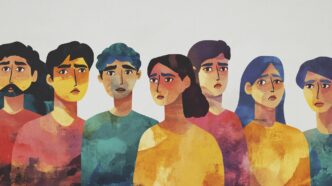This article was co-written by Rufaida Huq and Nusaira Hassan
With Bangladesh undergoing one of the most turbulent phases since its inception, everyone is striving to contribute to the future trajectory of the country in some way or another. But how do you make an impact on the country when you are not even here? That is the question that many NRBs (Non-resident Bangladeshis) have asked themselves in recent times, and some have decided to reverse the brain drain. In doing so, they are committing to rebuilding their birth nation. After noticing the chaotic situation, many people showed solidarity on social media, using the hashtag #ReverseBrainDrainBD. Although praiseworthy, this issue sadly worked like a one-hit wonder, with a visible output yet to come.
NRBs, mostly students and young professionals, took to social media to voice their support for the revolutionary student movement. Across Facebook, Instagram, and even X (formerly Twitter), many students demonstrated their willingness to return and participate in rebuilding the nation they had bid goodbye to previously. A lot of these youngsters had planned their lives around earning a foreign degree and settling abroad for good. Yet many others had chosen to pursue master’s and doctorate degrees to take a chance at their dreams.
The Case for Studying Abroad and Scoring a Job
Leaving behind families, friends and the comfort of homes has been a trend since the Colonial times. Back in the day, people would choose to immigrate to Britain and settle in London for good. Over time the USA, and eventually, Canada became more favored destinations due to relaxed immigration policies. Nevertheless, going abroad for higher studies has remained a popular option for those who could afford it.
Despite a significant increase in domestic higher education opportunities, the number of Bangladeshi students going abroad has tripled in 15 years. According to the latest UNESCO data, a total of 52,799 Bangladeshi students went abroad for higher education in 2023. The number was 24,112 in 2013 and 16,609 in 2008. In stark contrast, recent data reports from the University Grants Commission (UGC) indicate that only 2,317 international students enrolled in Bangladeshi public and private universities in 2020. The number has decreased to 2,281 in 2021 and 1,957 in 2022. This noticeable imbalance underscores the soaring tendency to seek higher education outside Bangladesh, alongside a grim picture of the growing reluctance towards the Bangladeshi education system among foreign students.

The ones who are part of the failing education system here know and understand that the job market has few opportunities. There is an inherent lack of specialized jobs, especially highly technical ones.
A lot of engineers are employed remotely and don’t even work as per the usual Bangladesh hours.
Bangladeshis leave the country in search of a better job, a higher income, and a better and improved standard of living that their birth nation is sometimes unable to offer them. Being able to snag a good job that offers you a work-life balance and can support you financially in a city like Dhaka, where the cost of living continues to mount daily, is an exception and not the rule. Starting salaries in some jobs start woefully at a meager BDT 15,000. An average person living, commuting, and buying groceries will tell you that it’s not enough.
“More than 40 lakh graduates are entering the job market every year. Where will they work?” said Dil Afroza Begum of the UGC, adding that students in developed countries get jobs after finishing their undergraduate studies, ensuring a secure future. So, a secure future is also a matter of uncertainty here. The basics of economics will tell you that the supply of students across different fields and subjects far outweighs any potential market demand for the same.
Most NRBs become NRBs in the first place because they search for a better life. Now granted, there is a struggle period that everyone has to go through, even when they are abroad. Not everyone is privileged enough to have a safety net and know they have the financial backing to live comfortably in Toronto, Texas, or even Tasmania, for that matter. Having said that, grinding and going through the hustle does make it worthwhile, and after a few years, people do end up doing well for themselves.
In Bangladesh, so far, scarce opportunities coupled with a lack of meritocratic processes prevent ascension, and workplace politics further stunt advancement. Most people who left the country in the first place did so to escape the same, making it highly unlikely that they will return.
There are also migrant workers leaving the country for odd jobs and mostly blue-collar work in the Middle East and Europe. While these workers, mostly semi-skilled or low-skilled, are eventually forced to return to the country, they can fend for themselves for a significant amount of time.
The Passport Dream
“Many people want to live here, so at least they can get their hands on a passport, allowing them to leverage citizenship benefits that they wouldn’t get in Bangladesh. It also allows them to travel to other places without a visa, which in recent times has become more and more important.” A second-year MBA student at the University of Toronto shared her views on why people choose to stay.
If you are studying in Canada, chances are you will be rewarded with citizenship or at least a PR (Permanent Residency Card) eventually.
Whereas the process is way more stringent in Australia, and even more so in places like the UK and USA, chances are that people will be able to carve out a comfortable niche for themselves in their adopted country subsequently.
Countries like the USA or Australia specifically cater to those students or immigrants who have specialized or technical skills, allowing ease of scoring the much-coveted ‘blue’ passport. Given that most of these science-background or engineering graduate students are the ones who struggle to find adequate employment here in Bangladesh.

Does it make sense to return?
Now, is the ‘Reverse Brain Drain Trend’ going to be yet another flash in the pan, or are people going to return? If the very factors that encouraged the students to leave the country persist after so many years, then why should they even consider returning in the first place?
There must be some pulling factors from the home country that could attract the students studying abroad to return and work for their homeland.
Political stability, economic liberalization, infrastructural development, social security, and proper recognition of raw talent are a few important factors among many.
The flexibility to return to Bangladesh is contingent on many aspects as a result. Will the returnee be able to score a decent job here? Will their skills not be rendered futile in an economy such as ours? And finally, there is still a stigma associated with returning to Bangladesh as a supposed ‘failure’ after having moved abroad.
Also, the nature of education plays a crucial contributing factor in deciding whether an NRB can successfully re-assimilate into the professional landscape of Bangladesh. For instance, those who pursue MBAs abroad do so to score a job in consulting or investment banking. Those MBAs are inherently designed to prepare individuals for a career in the Big 4 or a Goldman Sachs equivalent. Others are still pure science graduates who are passionate about research, which is woefully lacking, if not absent, in Bangladesh.
The university infrastructure, especially concerning research in engineering, science, and medicine, has a long, winding road to go.
Of course, some complete their PhDs and return to Bangladesh to pursue academia, contributing towards education in the country. However, the teachers are simply cogs in a much bigger, crumbling machine than is the education system. Public universities are especially held back in terms of meritocratic recruitment. Not to mention that the pedagogy and curricula are outdated while the academic boards and teaching staff continue to suffer from Colonial Hangover and preach Victorian morals more than actual course material in classrooms.
On the flip side, the choice to stay or return to Bangladesh may no longer rest with the students going forward. With Canadian PM Justin Trudeau, planning to cut down upon foreign student permits, and tightening rules for temporary workers starting next year – preference for Canada as a destination of immigration and longer work permits is likely to take a hit. Furthermore, prioritization of Canadian workers over temporary ones as well as permit holders is likely to further reduce opportunities for international applicants. Coupled with the housing crisis, this could deter new, international graduates from staying back.

Should we rely on NRBs?
The short answer is no. We cannot entirely focus on the NRB population giving up on their personal dreams and current lifestyles to return here to rebuild the nation. Bangladesh prides itself on a demographic dividend: the younger population. While many may be leaving permanently, there are still more who are already here and plan to settle in Bangladesh for good. It’s not fair for them to be tossed aside.
The longer answer, though, is more nuanced and requires organized planning to be effective. A comprehensive solution to a complex problem requires the development of policies that address the immediate issues while also considering long-term objectives. Simply put, the issue at hand cannot be adequately addressed through simplistic or binary reasoning. Effective solutions must be developed through rigorous analysis and methodical planning.
How can NRBs really help?
There are a multitude of ways that NRBs can help rebuild the nation without physically being present in the country. One of the major ways is through remittance. As the International The The Organization for Migration (IOM) states, Bangladesh is the sixth-largest country in the world for sending migrants and the eighth-largest country for receiving remittances. As per the latest data from the Bangladesh Bank, remittance inflow stood at $23.91 billion in FY24, rising by 10.66 percent compared to the year prior. Continuing to send money home that is in turn used by the families can inject much-needed momentum into the economy, which is currently stunted.
Indeed, the NRBs have been a contributing factor in the economy of Bangladesh by adorably increasing the sum of remittances every fiscal year; the responsibility to make the best use of it, however, irresistibly falls upon us, the countrymen.
Many others want to help by sharing their experiences, knowledge, and skills. A lot of the students and young working professionals are already contributing through mentorships. Common platforms on popular social media sites can allow students and aspiring professionals to seek out and receive support from those who are living abroad. A more organized platform and a structured approach for NRBs to act as leaders, and mentors and provide much-needed guidance can actively make a difference.
Encouraging joint ventures between NRBs and local entrepreneurs will help combine global expertise with local knowledge. This can be effective in sectors like technology, manufacturing, and services.
NRBs can further play a significant role in mentoring and training local professionals.
The government can create policies that incentivize both remittances and local investment, ensuring that funds are channeled into productive sectors that generate long-term economic growth and job creation.
Others still support them and can continue to support them financially. ‘Big brother initiatives’, whereby a more mature and older individual can support someone younger from a less privileged background through mentorship and financial support, and the former would be morally responsible for the welfare of the latter.
“I visit Bangladesh every year for four months to continue my project of arming Bangladeshi youth with digital literacy. I have been doing so since 2022 and have successfully deployed 300+ computers in rural areas of Bangladesh. However, I do not plan on returning to Bangladesh indefinitely unless I am called. I would 100% stick to the reverse brain drain trend. I am willing to dedicate my entire time and knowledge, both in the field and at the policy level,” said Ragib Ehsan Shadab, the co-founder and CTO at JaduPC.
What needs to change for students and young professionals to strive here?
Post-conflict financial planning must align with national priorities and implementation, properly avoiding the external imposition of conditionalities. However, the plan must transcend a transactional relationship. It should serve as a sense of sustainability between the state, society, the private sector, civil society, and communities. By adopting an inclusive approach, we can work toward a collaborative effort, strengthening bonds within the country.
There needs to be a top-down change towards improving the state of education in Bangladesh. Firstly, policy-level initiatives need to be taken to bring about changes in approach. The curriculum needs to be more tuned to the needs of the economy and global marketplace, creating professionals who can think critically and not simply spew whatever is in outdated textbooks. There needs to be a significant overhaul in the pedagogy—a more interactive classroom setting where students don’t simply take notes and teachers are prepared to teach.
Digonto, a Bangladeshi student pursuing higher studies in Australia, said, “Students have shown their power. Now, I believe it’s time for our education system to prove its ability to be one of the best in the world.”
Secondly, there needs to be greater awareness of jobs for the future and jobs that the economy truly needs. Beyond policy documents, many goals of the country remain unrealized. For example, the recent National Logistics Policy was published and highlighted the importance of having skilled professionals in the said sector. Similarly, a Blue Economy has theoretically been an important goal for the country to capitalize on its Bay of Bengal access. Education and jobs need to be tied to the future of students.
Industry and job synergy are crucial to ensuring that students who study engineering don’t end up as cashiers in one of the multiple banks in the country. Academia needs to work closely with industry to develop young minds and not render their skills redundant.
The difference between developed and developing nations lies in their capability to influence and produce cutting-edge knowledge. The substantial gap between these two types of nations has resulted in a situation in which many students from less developed countries move to industrialized nations for advanced degrees and, to be more specific, a better life.






